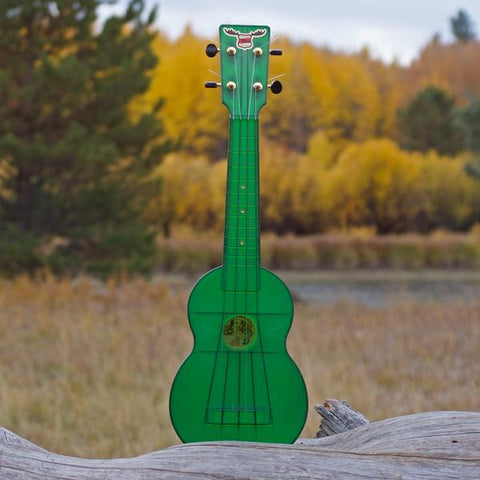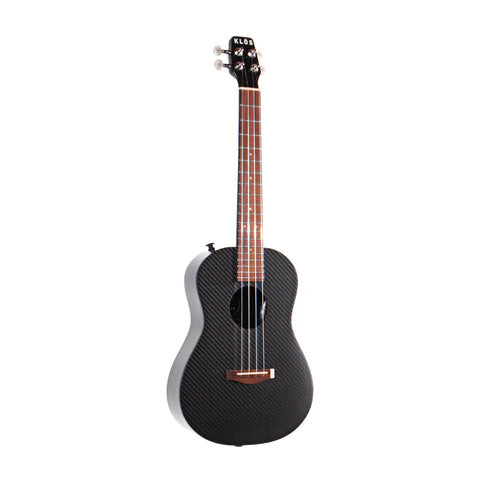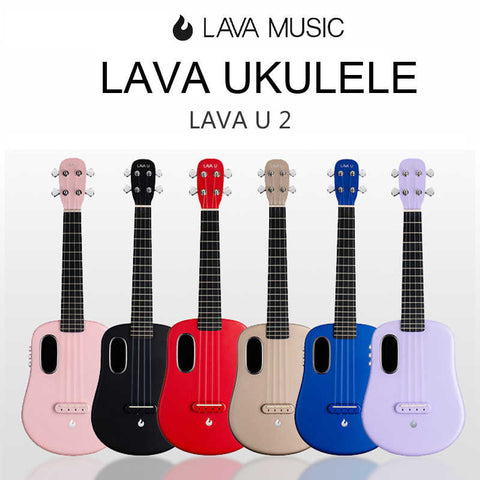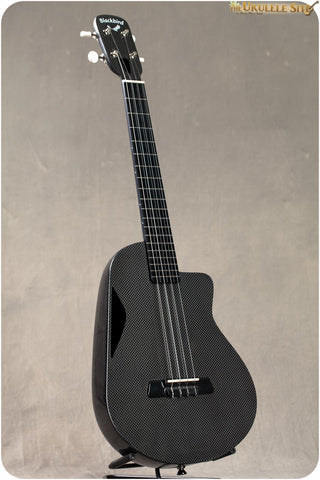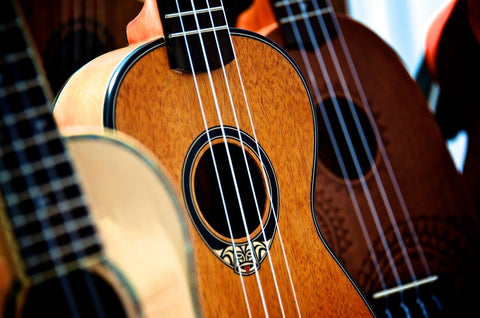
The ukulele is a marvelous instrument - it's charming, compact, and easy for beginners and accomplished musicians to pick up and learn a tune in minutes.
But there is also one problem with the ukulele - there are so many choices! How do you know which one to buy?
There is a reason ukulele players joke around about U.A.S., or Ukulele Acquisition Syndrome to the uninitiated. (I even wrote a song about it, see below or click here) Not only does the ukulele come in four different sizes - soprano, concert, tenor, and baritone, but it also comes in different shapes, woods, colors, and materials (I'm looking at you carbon fiber and plastic). Ukuleles can also be fairly affordable, so it's easy to pick up a few with a low price tag, and before you know it, you have a family of ukuleles.
Let's break it down into categories to help you decide which instrument is right for you.
First, let's take a look at the four main sizes.

Soprano:
Soprano is the size of ukulele most people think of when they imagine a ukulele. While there is a bit of variety in the ukulele world, the soprano is usually about 21 inches long with a scale length of 13-14 inches and anywhere between 12-15 frets. It has the highest tone of all of the ukuleles and due to it's small size, is easy to throw into a backpack. It's a great starter instrument for kids as well as adults whose fingers aren't too thick.
It looks like this:
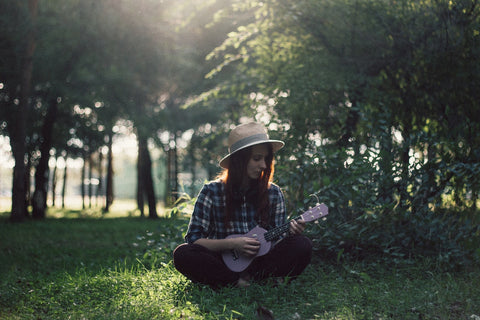
Concert:
The next size up is the concert which is about 23 inches with a scale length of 15-16 inches and about 15-20 frets. It is a great choice for someone wanting a smaller ukulele that's easy to throw in a backpack, but who wants a little more space for their fingers. It is a semi-tone lower in pitch than the soprano, which is a very subtle difference.
Tenor:
Believe it or not, this is the size preferred by most ukulele players. While the soprano is compact and easy to bring with you everywhere, the tenor has the most space for your fingers while still remaining in the re-entrant tuning of GCEA. The tenor has a typical body length of 26-27 inches with a scale length of 17 inches and about 15-20 frets. With its longer scale length, it also allows for more chord inversions down the neck as well as the ability to play arpeggios up and down the neck.
Baritone:
Now this ukulele is special because it is not in the same tuning. It is tuned like the bottom 4 strings of a guitar or DGBE. It also usually has at least two steel wound strings, unlike its siblings in the ukulele family which are usually nylon. It is also the largest ukulele at 30 inches, with a scale length of 19 inches and at least 19 frets.
With the DGBE tuning the baritone is the perfect bridge for the ukulele player into the guitar world or for the guitar player wanting to transition into ukuleles. While the chord shapes are the same for the standard tuned ukuleles (though they are in the G tuning), many of them are also shared by the guitar so it makes it easier to transition from one instrument to the other.
The largest challenge for the baritone ukulele player is constantly referring to their chord chart or transposing chords in their head when the baritone version of songs in songbooks or on websites isn't offered. However, the advantage of the baritone is it is in linear tuning which means learning to solo on it gives you an extra string to work with. You also don't have to decide if you want a low-G or high-G string for standard ukulele players who prefer linear tuning.
Sopranissimo:
I know, I said four main sizes, and this, technically, is a fifth size. I don't consider this a main size, but rather a variation that's a novelty. Most people don't play a ukulele this small because it's really tiny. It's also super adorable, but due to it's small size few manufacturers do a good enough job with it to make it anything but a toy or cute wall hanger. That being said, in the ukulele world, there is always an exception to the rule, and Ohana does a good job of creating a playable Sopranissimo. This ukulele is smaller than its larger counter part the soprano, and sounds best tuned up to A D F# B, which is also known as D6 tuning. This type of ukulele I wouldn't recommend for beginner players because it is so tiny and because of the D6 tuning which was once in fashion in the last century but is less popular now. However, once you get the hang of playing, you might find it irresistible as it can easily fit in a backpack or large purse. I have taken mine on flights across the country by shoving it in it's small padded case inside my carry on bag.
You can see me perform one of my songs, Follow the Beat of Your Own Drum at the Vermont Ukulele Harvest in 2018 on this tiny ukulele.
Next up, let's examine materials and woods.
Laminate, solid hardwood, or other???
Most people's first instrument purchase will be a laminate wood ukulele. So let's explain what the difference between laminate and solid hardwood is.
A laminate ukulele is one in which a thin layer of hardwood, (mahogany, acacia, walnut, cherry, willow, mango, spruce, myrtle, cocobolo, or koa are popular choices), is sandwiched together to a thin piece of less expensive wood. This sometimes makes them a more economical choice, but this is not always the case.
The pros of having a laminate ukulele is that they are typically more stable and less prone to warping and cracking than a solid hardwood ukulele. This is great if you live in an area that is particularly dry or has dramatic temperature and humidity fluctuations. Laminate ukes generally require a little less babying. I keep a few of mine on the wall year round in southeastern PA and they are fine. The solid hardwoods, however, are always kept in their case with a humidifier during the winter months.
The quality and sound of laminate ukuleles, like anything else, varies. Some are cheap and will sound like boxes. Others will surprise you with their tone and sustain. You should always try to play the uke you are interested in or try to listen to as many YouTube sound samples as you can. I find most people have a tone wood they prefer the sound of; I am partial to mahogany and other woods that sound similar.
Lastly, because they are cheaper, you can find them in a variety of colors and fun patterns and this is generally not found on solid hardwood ukuleles. This is often a selling point for children and adults alike, as they want a ukulele to reflect their personality.
A solid hardwood ukulele is made from one piece of solid wood rather than two thin pieces. The benefit is that solid hardwood ukuleles often sound better over time as they "open up" and often have a better sustain and tone than laminates. For this reason, they are often more expensive than laminates and they also require more care. They can be hard to maintain in very dry climates, as wood instruments require a humidity level between 45-55% to prevent warping or cracking. I have a tropical hardwood ukulele that during certain winters had to have two small humidifiers in the closed case as well as be kept in a humidified room.
Other materials for ukuleles:
In an effort for both sustainability and to be more flexible in dry, hot climates, some ukulele manufacturers have come up with some alternative materials for ukuleles.
In the cheapest range is plastic. This is my least favorite material for ukuleles and you can tell it by its terrible sound. The ukulele often is seen by other musicians as a toy, and plastic ukuleles tend to confirm that suspicion.
That being said, there are a few manufacturers who have come up with plastic/carbon fiber hybrids and have made some nice sounding ukuleles, my favorite being The Outdoor Ukulele.
The Outdoor Ukulele is a nice sounding, perfect for travel, anytime ukulele. The tenors sound especially nice and have a tone that rivals some wood ukuleles and they are almost impossible to destroy. I like to take mine to the beach, on a plane, or leave one in the car for long trips because I know I can't ruin it in the heat. They also come in several colors (I own the bottle green Soprano and the Sapphire Blue tenor), but they sometimes have limited edition runs in clear and purple. They are made in the USA by a family in Bend, Oregon, so you can also feel good about your purchase because you are supporting a small business based here in the US.
In the same vein, you can also find all carbon fiber ukuleles made by KLOS. I had the opportunity to play some of these in person at Summer NAMM in Nashville in 2018 and they were also a joy to play. They don't come in as many cool colors - just black for now, but they do have a great tone and travel very well. They are perfect for the traveling musician.
Another carbon fiber ukulele option that also has built in amplification features is the Lava U ukulele. By just pressing a button, you can electrify your ukulele and add chorus, delay, and reverb effects. Bernadette from Bernadette Teaches Music on YouTube has a great review of the ukulele that you can check out.
Lastly, there are a few ingenious ukulele builders out there who have come up with a sustainable way to make ukuleles that involve no wood and no plastic. They made a plant fiber based composite called Ekoa into these beautiful, great sounding, high end ukuleles called Blackbird. They are sold through The Ukulele Site and are amazing, especially for those of you living in desert climates. I had the pleasure to play one of these at an ukulele festival and was so upset I didn't own one. Maybe one day... Until then there is always window shopping.
Where should I purchase my ukulele?
These days there are lots of options online as well as in person. I personally like to support small, family run businesses as much as possible because you get the best customer service and typically the best knowledge of the instrument because the people running the business actually play the ukulele and have a love for that instrument. There are big box stores that sell ukuleles and it's ok to start there if you have no other options, but I typically find their selection is not great. Big box stores are typically forced to carry lines of products available through a distributor and that does not always translate into a well-designed instrument. The sales people are often hired because they have an all around knowledge of lots of instruments, but they are rarely ukulele players themselves. I am sure there are exceptions out there, but this has been my experience.
So... I have some recommendations of ukulele dealers I have personally met through festivals and trade shows, people who specialize in the ukulele and actually play it.
Mim's Ukes - Mim is a one woman business and has a wealth of knowledge about wood tone, set up, and what brands of ukulele are best. In fact, she only carries ukuleles she likes the sound of and she has a personal relationship with her companies. You absolutely cannot go wrong with Mim. She even throws in a set up of your ukulele for free (something big box stores will charge you $75 for).
Funky Frets - Funky Frets is a lovely family run business located in Boyertown, PA. They have a cute, ukulele devoted shop and Curt Sheller, their owner, has written many definitive ukulele instructional books and is a marvelous musician. They were previously a mostly in person brick and mortar shopping experience, but the pandemic has forced them online, so you can now buy there as well. :)
They also run the annual Funky Frets Ukulele Festival the first weekend of October, so you should check out that too.
The Ukulele Site - A Hawaiian based ukulele brick and mortar shop as well as a comprehensive online store, they specialize in many Hawaiian brands, as well as some more exotic ones, like the aforementioned Blackbird. They have videos that demonstrate the instrument's sound on each listing which is helpful for both window shopping (and drooling), as well as for your purchasing decision.
Joyner Instruments - Adam Mendel crafts some of the finest electric ukuleles I have ever played. I own three! If you are searching for a quality, handmade electric ukulele, these are amazing. He also takes custom orders should you want a particular wood or a whammy bar (like I did, twice, on my baritone electric ukuleles).
Sparrow Ukulele - John Gonzalez, owner of Fan Guitar and Ukulele (in Richmond, Va) started this line of electric ukuleles recently and his are also beautiful. I had the opportunity to try them out at the last in person Funky Frets festival in 2019 and they were awesome. I haven't been able to purchase one just yet, but there will come a day. :)
There are many more small businesses who sell ukuleles other than these listed above - please visit our dealers page to see if there are some near you.
Can you purchase a ukulele on Ebay or Amazon? Yes, of course. Just be sure to check out some videos on YouTube to see if you like the sound and read some reviews.
Melissa's Collection
Below is a list of ukuleles I personally own and love. They are great brands to start with.
Ohana TTPK-25G (a teeny tiny sopranissimo)
Ohana CK15WG Willow
Ohana SK-28 Vintage Nunes Style
KoAloha Opio Tenor
Cocobolo Tenor #218
Mya Moe Striped Myrtle Tenor #1825
Joyner Instruments Electric Tenor in Walnut
Joyner Electric Baritone in Swamp Koa and African Mahogany with a Bigsby Tremolo Bar
Joyner Electric Baritone in Quilted Maple with Whammy Bar
Mainland Mango Baritone
Kala Resonator Tenor
Goldtone BUC - Concert Banjolele
Outdoor Ukulele Soprano in Bottle Green
Outdoor Ukulele Tenor in Sapphire Blue
Magic Fluke Flea - Concert in Blue
Risa Tenor Electric - Tobacco Sunburst
Questions?
Not sure which ukulele to buy or want to know more about my collection? Feel free to leave a comment below.

